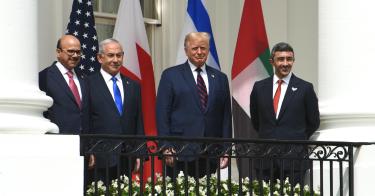On Sept. 15, 2020, President Donald Trump brokered the signing of the Abraham Accords, normalizing relations between Israel and the United Arab Emirates, and Israel and Bahrain.
This historic achievement creates a pathway for increased cooperation between American, Israeli, and Arab countries on trade and investment while strengthening the abilities of all three to deter Iranian aggression through previously unheard of Arab-Israeli defense cooperation.
In April 2021, the United Arab Emirates Air Force flew alongside Israeli fighter jets for the fourth time in Greece’s annual Iniochos aerial training exercises, which also included the U.S., France, Spain, and Cyprus.
The exercise allowed the United Arab Emirates and Israel alongside other participants to work together to complete different aspects of a shared mission by practicing air-to-air combat, air-to-ground precision strikes, and evading attacks from surface-to-air missiles.
>>> Iran Looks East: Building Ties with China
Shortly after the Iniochos aerial exercise, the chief of the United Arab Emirates Air Force, Maj. Gen. Ibrahim Nasser Mohammed Al Alawi, attended Israel’s Blue Flag aerial exercise in October 2021. Occurring biennially, the joint exercises featured 75 fighter jets and 1,500 personnel from the United States, Israel, France, Germany, Greece, India, Italy, and the United Kingdom.
Although the United Arab Emirates planes did not participate in the exercise, Amir Lazar, head of the Israeli Air Force, characterized the significance of the visit saying that Israel and the United Arab Emirates would “someday” be “working together” to counter Iran.
Alongside aerial cooperation, maritime collaboration between Arab, Israeli, and American forces are increasingly important to deter Iran in the Persian Gulf.
Iran has repeatedly threatened to restrict, or cut off altogether, the free flow of trade in the Strait of Hormuz. In this year alone, there have been at least 11 major incidents in which naval forces belonging to Iran’s Islamic Revolutionary Guard Corps have hijacked commercial oil tankers and harassed U.S. Navy ships.
In early November, U.S. Naval Forces Central Command, Israel, the United Arab Emirates, and Bahrain conducted a joint military exercise in the Red Sea. The first publicly acknowledged naval exercise between the United Arab Emirates, Bahrain, Israel, and the U.S. Naval Forces Central Command included the U.S. Navy’s 5th Fleet in Bahrain and a coalition of 34 countries that make up the Combined Maritime Forces whose purpose is to carry out counterterrorism and counterpiracy operations in the Arabian Gulf, Red Sea, Gulf of Oman, and parts of the Indian Ocean.
The five-day exercise was designed to broadly enhance naval collaboration between maritime operations teams to safeguard freedom of navigation and the free flow of trade. As a result, Arab, American, and Israeli navies can effectively work together to deter Iran in critical waterways like the Red Sea and the Strait of Hormuz.
One of the biggest concerns is Iran’s use of anti-ship mines, which it has deployed in the Persian Gulf during past conflicts to prevent oil tankers from entering and exiting Arab ports. Since the Iran-Iraq War in the 1980s, Iran has more than quadrupled its stocks of both conventional and advanced “smart” mines to well over 6,000.
Although the U.S. Navy has a small, aging force of minesweepers, its capabilities are limited given the large quantities of Iranian sea mines spread across the Strait of Hormuz. Should the U.S. find itself in active conflict with Iran, the U.S. Navy’s 5th Fleet would be vulnerable to attacks in the Persian Gulf.
>>> Afghans Need Our Help. Will the Biden Administration Step Up?
To better deter the potential damage inflicted by Iranian anti-ship mines, state-owned Israeli and Emirati defense contractors Israel Aerospace Industries and EDGE, respectively, announced plans to jointly design a semi-to-fully autonomous naval vessel at the Dubai Airshow. Called the “170M,” these vessels are capable of mine detection and sweeping; anti-submarine warfare; intelligence, surveillance, and reconnaissance; and deploying for certain types of aircraft.
Platforms like the 170M will undoubtedly be a valuable asset to U.S. Naval Forces Central Command and its Arab partners operating in the Persian Gulf and are just one example illustrating the promise of further Arab Israeli defense cooperation.
Further participation in multinational aerial exercises such as Blue Flag 2023 and Iniochos 2022 will allow the United Arab Emirates to continually refine its integration of fourth- and fifth-generation fighter aircraft, and enhance its ability to operate in conjunction with U.S. partner forces, including Israel.
The Abraham Accords have shifted the geopolitical order in the Middle East. As the U.S. withdraws from Afghanistan, and takes a step back from Iraq, and Syria, Arab-Israeli defense cooperation will be paramount to deter Iranian aggression, safeguard the free flow of trade, and maintain stability in the region.
This piece originally appeared in The Daily Signal



